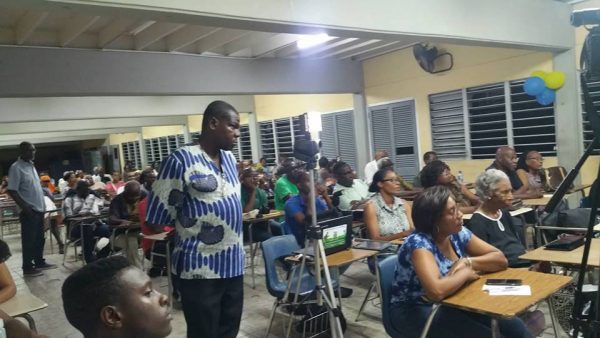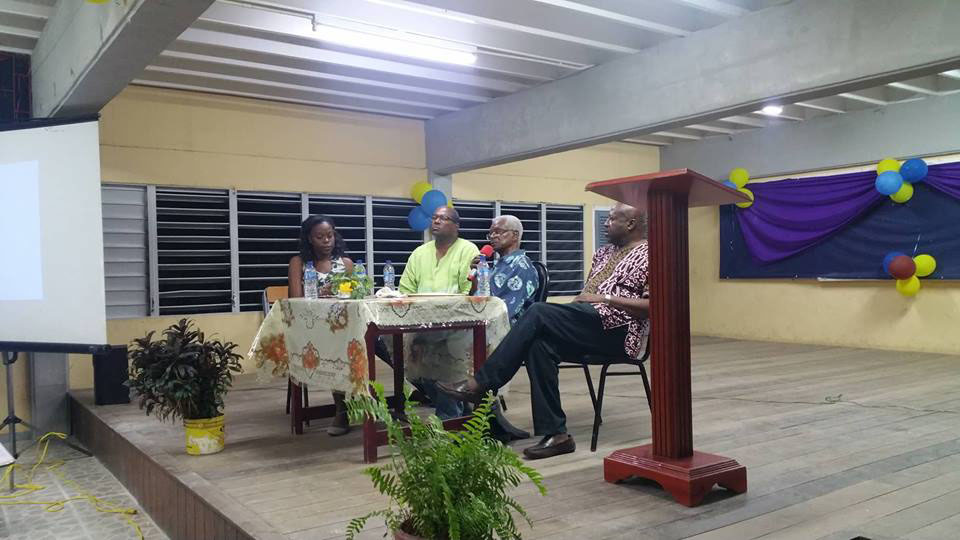Regardless of what multilateral agencies may advise, Guyanese must pressure the government to tap monetary rewards from oil revenues if this country wants to have true equity and see a real lowering of poverty, economist, Professor Clive Thomas yesterday said.
“I believe that some portion of the net cash flow from oil should be dedicated and be given as cash transfers to every single household in this country…,” Dr Thomas last evening told attendees, at an event organized by the Buxton 1st of August Movement which was held at the Friendship, East Coast Demerara Primary School.
Further, he added, “I don’t think giving cash transfers to persons are a waste of resources. If you look at the evidence, cash transfers are the single most effective means of combatting poverty.”
Under the theme, ‘The Coming Oil and Gas Economy: Prospects for Empowering the Poor and Revitalizing the Village Economy’, Thomas, one of three panelists, was the most vibrant speaker and the one who had more live feedback from participants, who at times interrupted his speech with thunderous applause, as he laid out a plan for cash transfers.
The other two panelists were Attorney at Law Nigel Hughes and Maricia Charles who appeared on behalf of Minister of Natural Resources, Raphael Trotman.

Thomas gave his overview of the sector but focused primarily on direct cash distributions, which he called on his party, the Working People’s Alliance (WPA) to support and lobby for.
‘Whether it be US$5000 per year or whatever it works out at, we can put the figure together – there must be a mechanism in place to ensure every single household and by extension every single person, sees the benefits of oil and gas in terms of cash or cheque received in their accounts,” Thomas stressed.
No better spender
I believe there can be no better spender of resources a person wants than they themselves- nobody can tell you how to spend money better than you can yourself. As an expression to that person I believe there must be developed a cash transfer programme of some significance that makes sure that when all is said and done, out of the national pie a certain permitted amount of resources are transferred to the masses. That is an absolute minimum of what I was saying, the national debate is removing that further and further from reality,” he added.
Thomas posited that his optimism was founded on facts he would have gathered from public documents, research data and his experience not only as an economist but as a citizen of this country, where he would have seen his mother run her household on a tight but prudent budget.
It is in this vein that he believes that if citizens are given cash payouts, that they would not squander it or develop a mentality of dependence or self- entitlement.
“People heard of stories of boxers who made a lot of money in fights but then end up being poor. They know stories of people who won the lotteries and ended up being poor and they try to generalize from that, that this is the experience of every oil and gas economy. If we look at the facts, while that can and does happen, in most cases people, who win lotteries end up by being in the situation where their status has improved their lives and chances. It is not as if there are no risks…I am not claiming that calling for cash transfers means people might not spend it on consumption or wastage, but I am saying they would better conserve it than any other outside agencies- whether you call it local or central government.
“I grew up with a mother who, if she had money, she would have spent it on the same things she spent it on then- and that is education for us, and she lived in Albouystown. Poor people know their needs. What they want is a chance and opportunity to put it to use…When I say cash transfers, what I am trying to do is to transfer to the masses the capacity to run their own lives and to see development as something that they promote and they undertake and not somebody undertakes for them. The notion of welfare is far from this concept. There might be conditionality; things they are expected to do, but I am sure when people get that sort of money, they would be thinking of businesses and ways they can sustain and improve their livelihood and life situation going forward. They are not going to just take it and sit back and consume and wait for a cheque. So it is a gamble that I am taking, but a gamble on humanity, in which I think I will win because I know that historical experience has been on my side,” he added.
Difference
But Hughes, who is the local representative for ExxonMobil’s partner Hess Corporation, does not agree with Thomas and said that such a move in Guyana could quickly turn political with each party raising the stakes in campaign promises hoping to solicit votes.
“I have a difference to professor on this. This will probably have to go to data, but my caution and hesitation is driven by a couple of things. Back in the day, the general consensus in society was that we were all struggling to get to a better place. I think across the communities, especially, the village communities, people were striving generally to get better. Unfortunately statistics are … anytime there is a big concert in Guyana, pickpockets and robberies increase dramatically leading up to that concert. We are living in a different social era with different commitments and views on development,” he said.
“My fear is that if we start to talk about giving people cash, we are opening the doors to politicians to jump up and say, ‘ I gon give you more cash than the next one’ and we end up with a ridiculous campaign of people being irresponsible about development because it becomes a competition on who can give more. In the previous administration there used to be a lot of concerts with the hope of placating parts of our society—that is going to happen at a higher level. I fully accept that in the generation that my mother and grandparents came from, that they had a different perspective on life,” he added.
Hughes said that while he might sound pessimistic, there has to be a way that this country ensures that there is a rise in the education level across the board before such a mechanism could kick in as otherwise it would mean nothing.
“We need to start having a discussion based on data rather the hot air we see in the national newspapers. What is the criteria we are going to use to assess going forward if we are making progress, what are the benchmarks that we are going to use so that we don’t reduce it to discussions …?” he questioned.
“I welcome that discussion but I think we need to drag it to data, otherwise we are going to be dazzled by the fantastic promises that are going to come from the political pulpit unrelated to reality and economics of sustainability, and that is a dangerous place. Once we hear the music and the crowd start going, we [will start] running down the road to vote for who giving us more money, without any thought of how they gon pay it. And when they get in, they will pay themselves, we will have none and they will tell us about ethnic loyalty. I fully advocate the view but I think we have [to discuss more],” he added.
Thomas rejected Hughes’s assertions saying that experiences of long ago are still present today and that the same way people had faith in the youth of that era and encouraged and supported them, so do elders now need to give Guyana’s future leaders a fighting chance.
He believes that the direct cash disbursement could be incentivized where there are certain conditionalities that must be met before payout.
“I have confidence we can find ways around that and I recognize there is a generational change, but I think a lot of the change has been brought about through the environment in which we do things. The very act of doing that cash transfer and trying to put back responsibilities to households might be the very catalyst to return to a better way of bringing up families in Guyana. Many of the things you see today is the same then. I choose to think of a reservoir of people who want to be in different circumstances and that is the reservoir we want to tap,” he stressed.
“These transfers can be conditional. You get the educational transfer if your child improves school attendance. You get the health transfer if you prove that your nutritional intake has improved your family’s health in the period of time stipulated in the agreement. You have a child working and you bring them out and send them to school, you get it. It is not a mad science. The ingredient that is key is that you place the lives of the people in the hands of the people. I think people here will know the difference if a man comes and tells them, ‘I will give you $1M every week against someone saying realistically I will give you $1M annually. They know when they are being sold a can of goods. People are not stupid about their own lives and their own welfare…you’d have to be an idiot to believe that somebody would come and tell you they are going to give you $1M every day and you must vote for them. Everybody is going to laugh as you are laughing now,” he added.






